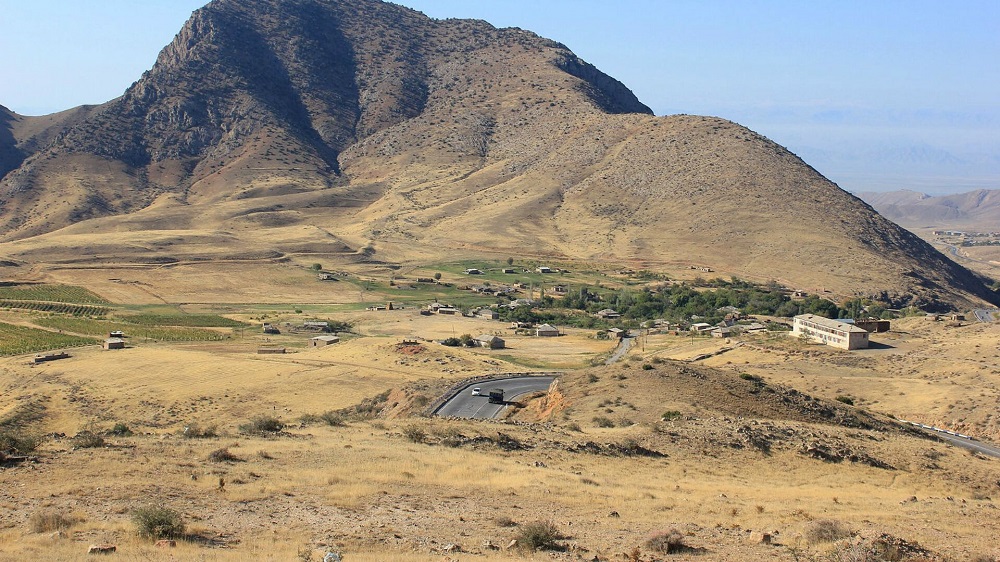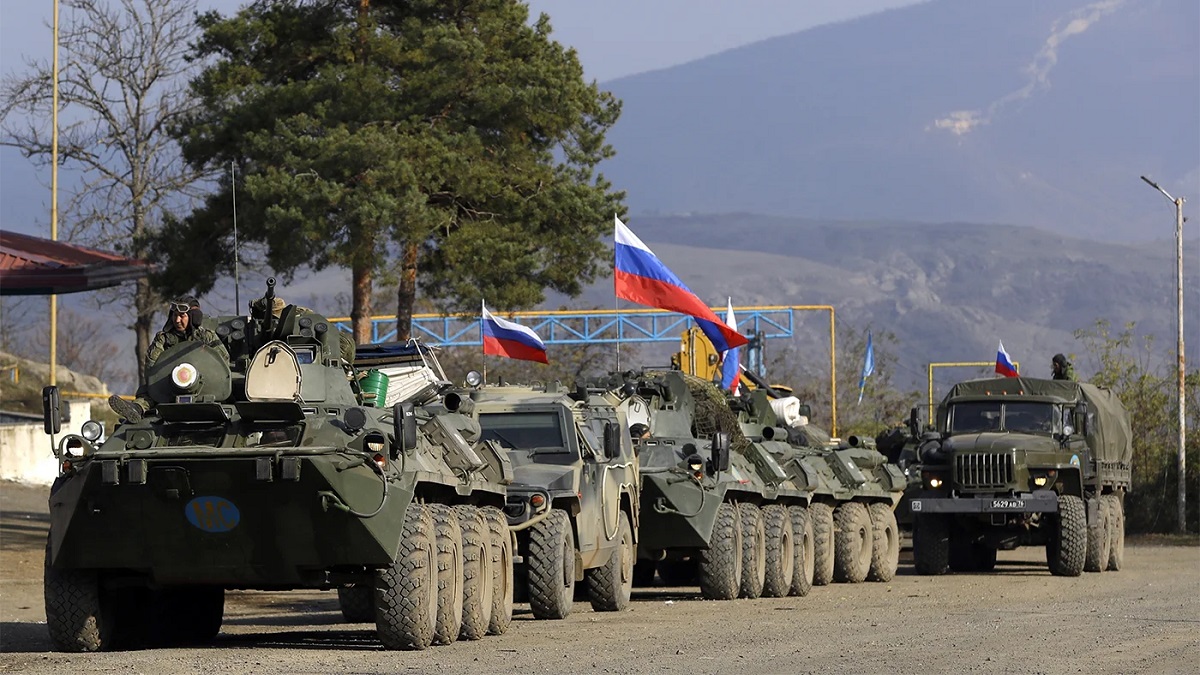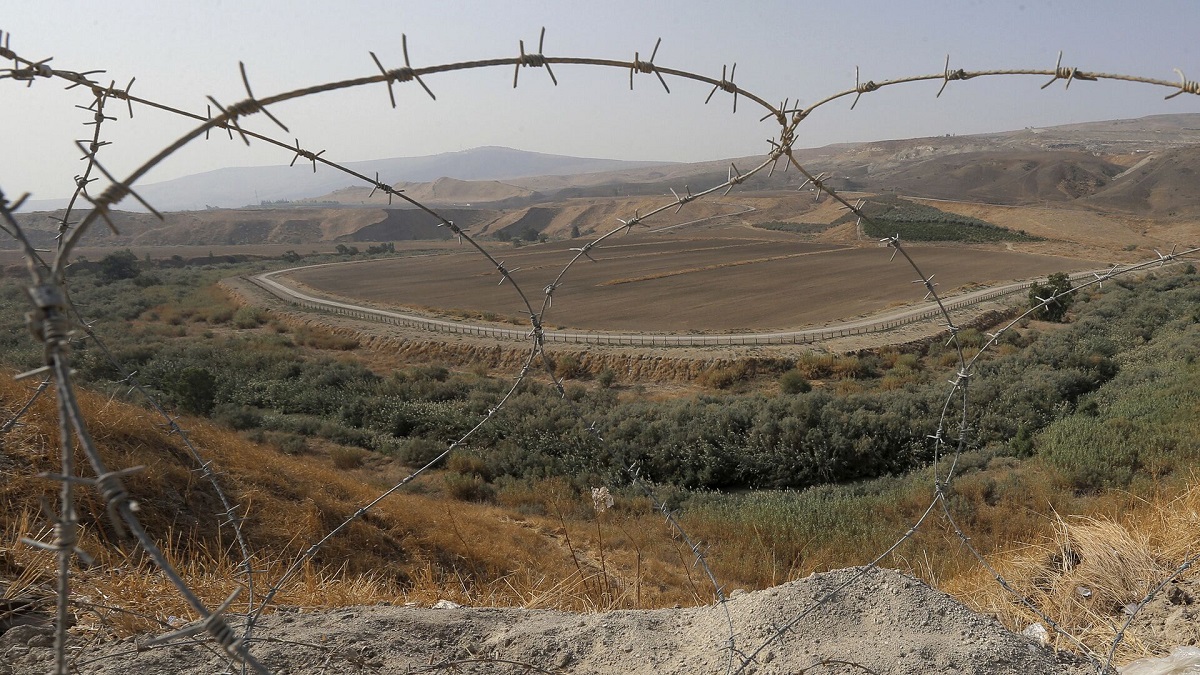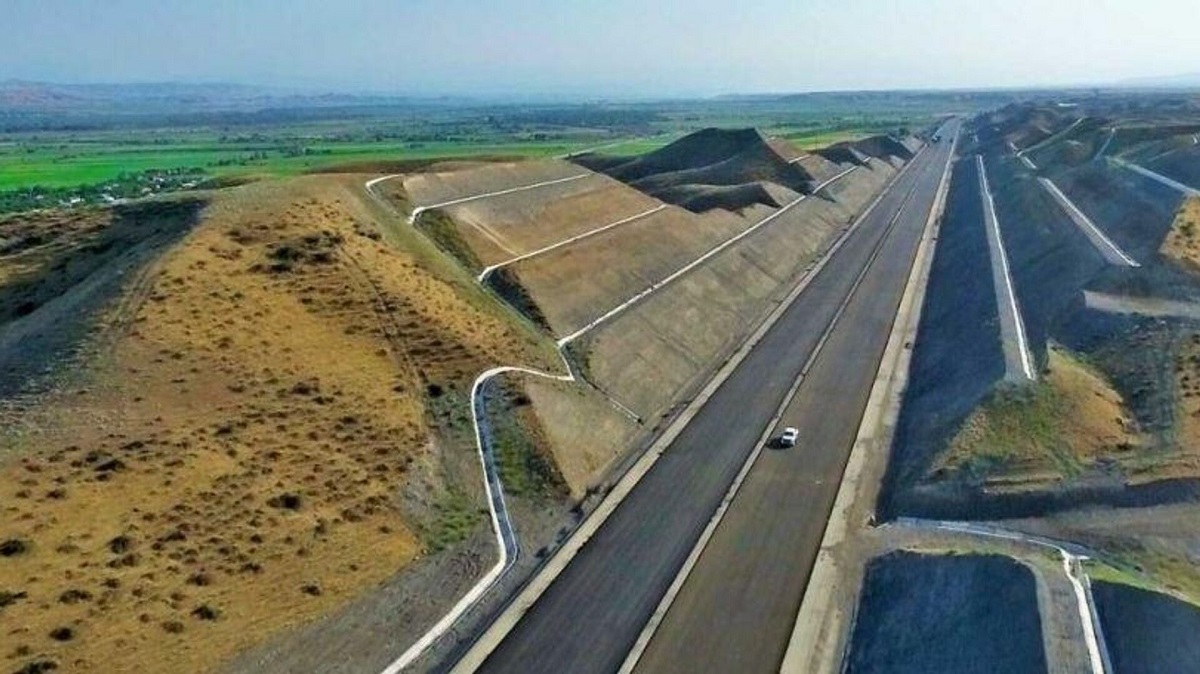Ilham Aliyev: "Delimitation and a peaceful agreement are two separate issues"
Ilham Aliyev on delimitation
“These are two separate issues,” said the president of Azerbaijan, commenting on the process of peaceful agreement with Armenia and the delimitation and demarcation of the state border between these countries.
“if we wait until the border between Armenia and Azerbaijan is delimited, and then a peace agreement is concluded, it may take us 30 years or more. Therefore, we propose to separate these two issues,” he said.
- The U.S. Sanction proposal to Azerbaijani officials: pressure or punishment?
- How Russia ensures its military with new armaments bypassing sanctions
- Josep Borrell: “I urge political leaders in Georgia not to derail the country from its European path”
In Baku, an international forum on the topic of “SDG 29 and Green Vision for Azerbaijan” took place.
President Ilham Aliyev participated in the forum and answered questions from participants.
Regarding Azerbaijan’s membership in the EAEU
Responding to a question from Daria Isachenko, an associate professor at the German Institute for International and Security Affairs, “Is Azerbaijan expected to join the EAEU?“, president Ilham Aliyev said that Azerbaijan had been invited to participate in some events of the Eurasian Economic Union at the level of the president and prime minister.
“I participated once as an honorary guest. And in general, Azerbaijan has very close partnership relations with all countries in the Eurasian Union, except Armenia. So, for us, this group of countries is not something very unusual. We know them very well.”
Aliyev stated that “currently, we have no such plans, but we cannot say that they will not arise in the future”:
“Everything will depend on what additional economic benefits we can obtain from convergence. If we see it, yes, we will make a decision; if not, then we will be content with what we have now.”
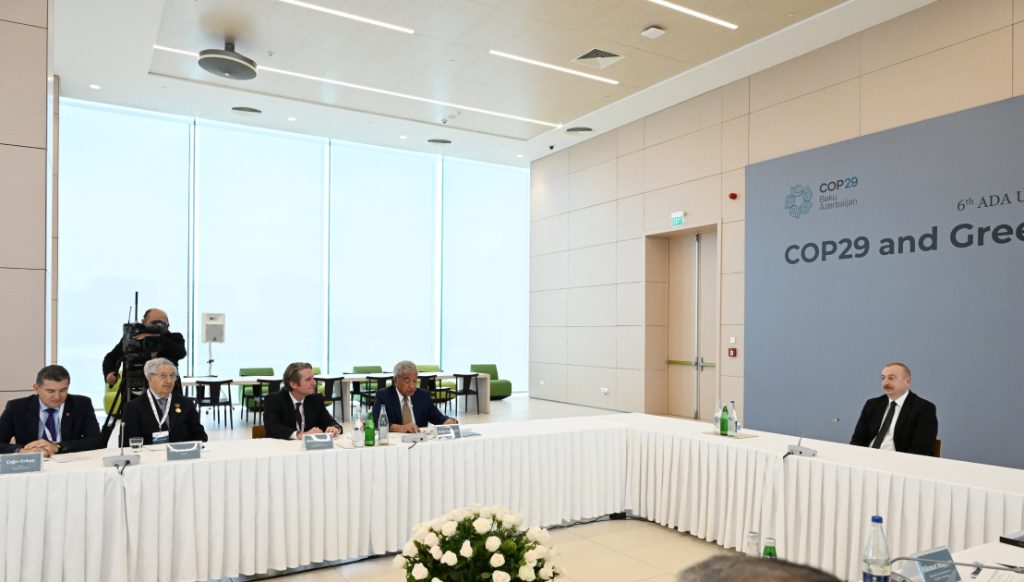
When will the peace treaty be signed?
Responding to the question ‘At what stage, in your opinion, will peace negotiations between Azerbaijan and Armenia be in the run-up to SOR29 [scheduled for November 2024 — JAMnews]?’ from Nigar Göksel, director of the International Crisis Group in Turkey and Cyprus, Aliyev said that there are good chances for significant progress on the peaceful path:
“Armenia do not insist, obviously, any longer on any mentioning of so-called Karabakh in any aspect. So, actually, this eliminates the most important obstacle. The rest of the paragraphs, I think, can be agreed, because there is nothing new, nothing, which we invented. All the principles are based on international law norms and a pragmatic approach.
We’ve been approached by Kazakhstan with a proposal to have a meeting between the foreign ministers of Azerbaijan and Armenia in Kazakhstan, and we agreed to that. If Armenia also agrees, the next meeting of the foreign ministers of both countries will take place there. I also want to make it clear, we are not talking about any kind of mediation. Because what happens now on our border demonstrates that when we are left alone, nobody wants to use the situation for their political ambitions, we can agree sooner than later”.
About the Zangezur corridor
Yoko Hirose, a professor at Keio University in Japan, asked Ilham Aliyev a question about the opening of the Zangezur Corridor:
“As it seems Armenia and Iran are against the Zangezur corridor I understand that it. What kind of policy does Azerbaijan have regarding the Zangezur corridor? In addition, Russia recently withdrew from peacekeeping operation in Karabakh but according to 2020 peace agreement Russian forces were supposed to maintain peace after Zangezur corridor opened. What will happen in this regard?“
Aliyev replied that according to the trilateral statement of November 10, 2020, a transport link should be established between the eastern part of Azerbaijan and the Nakhchivan Autonomous Republic, control over which is provided by the Russian border forces:
“For over three years now, Armenia has effectively violated this provision. And again, they themselves signed it, and now they want to get rid of this point, but it is impossible. They simply block the possibility of building this land connection with the Nakhchivan Autonomous Republic, and such behavior is certainly very disappointing.
How the trilateral Statement was signed is a different story. What were the circumstances? Also, everybody knows that there was a signature by the Armenian prime minister, and it must be respected. So, seeing that the process got stuck, we actually had to find another option. And we found it. We started consultations with the Iranian side and agreed to make a bypass through Iranian territory, actually on the southern part of the Araz River. We only need two bridges for transportation, and maybe two additional bridges for railroad, and by the way, the construction of the automotive bridges has started.
There was even a ground-breaking ceremony with the participation of high-ranking officials from Azerbaijan and Iran.
What will be in the end? Armenia will lose. They want to become a crossroads, yeah, they call it the crossroads of peace. But in order to become a crossroads of peace, first, they have to agree with us. Because if Azerbaijan does not agree to that, it will be just a piece of paper or a statement.
Without an agreement with us, it is absolutely useless. Unfortunately, they try to discuss it with different countries situated far, far away from the region. But when it comes to the point, they don’t want to discuss it with us. Our position is very clear. The trilateral Statement must be respected.
Land access from mainland Azerbaijan to the Nakhchivan Autonomous Republic through Armenia must be provided with international control and security mechanism. If they don’t want now due to some reasons, that it should be Russian border security, they should say it. But again, it is something they signed themselves, and they must respect their signature. So, it’s clear that they will lose the opportunity to become a transit country.
They’ve never been a transit country as independent country. I mean, they will never become because all these speculations about the so-called “peace crossroads” are absolutely unrealistic without Azerbaijan. If they think that someone will come and build a railroad from Iran to Armenia and Georgia, they need to find someone who will spend maybe five to seven billion US dollars for nobody knows which reason while there is a land connection between Iran and Azerbaijan and the North-South Transport Corridor is being built, and there is a real connection between Azerbaijan and Georgia. So anyway, it is up to them how to plan their future”.
About the withdrawal of the peacekeeping contingent from Karabakh
Aliyev also addressed the issue of the withdrawal of the Russian peacekeeping contingent from Karabakh:
With respect to the Russian peacekeepers, the announcement has already been made by the presidential administrations of Russia and Azerbaijan that they are leaving the Karabakh region of Azerbaijan before the timetable. And that was a joint decision by the leaders of Russia and Azerbaijan. I can also inform you how we negotiated this issue: I think it would be interesting.
I have already revealed a couple of times in my meetings with Azerbaijani journalists that on November 9th, when we were negotiating the trilateral Statement through President Putin because we didn’t have any contact with Armenian colleagues. So, there were several telephone conversations, agreeing every item of the trilateral Statement. It lasted from early in the morning until almost the morning of November 10th. That’s why we always say that the Statement was signed on November 10th because it was already, I think, 2 a.m. or even 2:30 a.m. in Baku.
The item regarding Russian peacekeepers was presented, and Armenia’s position was that there should be no time limit for them. In other words, they should stay forever. We could not agree with that. We insisted that there should be a time limit. That was one of the most difficult parts where both sides could not agree. For us, it was one of the most principal parts of the statement and our position was that if we do not agree on that, there’ll be no statement and the war will continue.
At that time, our troops were on the outskirts of Khankendi. We de facto controlled so-called Lachin corridor and the fate of 15,000 Armenian troops, which were surrounded. How we liberated Shusha, it was absolutely clear for everyone. They would have either surrendered or even worse for them. So, we said okay, there will be no agreement, we will continue. We will enter Khankendi within several hours. So, Armenia had to agree. Now I think they understand that we were right.
So, a five-year term with the possibility of extension if neither side objects was actually the starting point of the withdrawal of troops. So, what could have been the situation if we didn’t have that timetable? We can only guess. But again, the decision to withdraw troops earlier was made based on consultations between Azerbaijan and Russia. Azerbaijan is always committed to its international obligations. And our position was that if it is written November 2025, it must be November 2025. But at the same time, both Russia and Azerbaijan clearly understood that they could leave earlier, but again, it was a joint decision, and this decision, I think, only strengthened Russian-Azerbaijani relations.
About the issue of Azerbaijan’s and Armenia’s exclaves
Senior advisor at the UK Centre for Foreign Policy, Craig Oliphant, asked a question about the exclaves, to which president Aliyev responded:
“Delimitation and a peace agreement are two separate issues. I think, it would be wrong to combine them and make one dependent on the other. For a very simple reason, our border with Armenia something around 1,000 kilometers, maybe more, maybe less.
The biggest part of that border was under occupation for 30 years, from Kalbajar, from the Murov mountain to the Araz River, close to 500 kilometers. In Soviet times, even when we had administrative borders, some parts of the administrative border between the Armenian Soviet Republic and the Azerbaijan Soviet Republic were not identified. The biggest part of the border is absolutely uninhabited, and the height of the mountains is 3,500 meters, and for nine months a year, it is covered with snow. So, it’s really a very difficult terrain.
So, from a practical point of view, to delimitate this border within a short period of time is not possible.
Another two examples of the regional issues. Azerbaijan and Georgia, two friendly countries, and Armenia and Georgia, also two friendly countries, could not delimitate their border for more than 30 years. And not because, as I said, we have current problems, no.
Both Armenia and Azerbaijan have friendly relations with Georgia, but just because it’s a complicated issue. Our border with Georgia, I mean those segments of the border, which have been agreed is about 70% only. So, it’s a slow process. It is a process, which needs a high level of accuracy. Therefore, if we wait until the border between Armenia and Azerbaijan is delimited and then sign a peace agreement. So, we will wait only maybe 30 years or more.
So, our suggestion is to separate these two issues. Saying that I don’t want someone to misinterpret our position, or produce speculations. Azerbaijan and Armenia, when agreed on declaration of October 2022, clearly demonstrated that we will base our relations on well-known 1991 Almaty Declaration.
And second, we said that we do not have territorial claims against Armenia in case they don’t have territorial claims against Azerbaijan. We demonstrated it to Armenia that if they continue to have territorial claims against Azerbaijan, we will have territorial claims against Armenia and what will be the result of that? I think, now everybody understands.
After they publicly lifted territorial claims against Azerbaijan and recognized Karabakh as part of Azerbaijan, of course, from our side, there will be no territorial claims against Armenia”.
Ilham Aliyev also added that the proposal to start delimitation with the villages of the Gazakh district came from Azerbaijan:
We told the Armenia side that if they really want to demonstrate that they’re ready to move forward, they should do it because these are the villages, which were inhabited. It is not some uninhabited hills, which can be contested. They were inhabited by Azerbaijanis and were occupied. One of them was even occupied during the time of the Soviet Union in 1990. Actually, that’s when the war started against us.
And the fourth of them was occupied in 1992, after collapse of the Soviet Union. I think, around 10 or 12 kilometres of our state border, is already considered to be delimited. This is a significant moment. It is not by chance that many regional and non-regional countries already expressed their support to that. How the process will continue, we’ll see. As I said previously, both sides demonstrated constructiveness. Both sides understand the sensitivity of this issue, and at the same time commitment to international law. I think if the same approach is applied at a later stage, we can move faster.
There is also one issue, which we always raise from point of view of pragmatism that the border should be, of course, delimitated based on principles but at the same time, there are such parts of that border, which create problems for both sides. It concerns the roads, sometimes, security mechanisms, the visibility of the depths, or the territory of each other. Therefore, we must be creative.
We should not stick to the line and just go like a blind cat on that line. No, we take the line as a basis. But we must be reasonable and agree on such a border that will be safe and secure for both sides and comfortable for both sides.
So, as I said, the biggest part of the border and its surroundings are not inhabited places, but there are parts where people live close to each other. One of them was exactly the territory of those four villages where the distance between the settlements may be several hundred meters or maybe less. When we raise this issue of four villages, we raised it actually right after the Second Karabakh War. We never forgot about them.
The issue of exclaves is a different story because it’s more complicated as these exclaves are situated, of course, in the territory surrounded by other countries. Therefore, they must be addressed during the process of delimitation. If the Armenian side wants to address them now in the second stage, we are ready. If they want to address them later, we’re also ready.
After delimitation is finished and immediately demarcation is done now in that area of the four villages of the Gazakh region, I think, both sides, the two commissions on delimitation, must agree about the next steps. We don’t want this issue to be a kind of isolated episode. We want to continue on the path of delimitation. I would suggest starting maybe from the easiest part. If the Armenian side wants to start with the most difficult part like exclaves, we’re also ready for that.
About the future role of Russia in the South Caucasus
Professor Michael Reynolds of Princeton University in the USA, director of the program on diplomatic history and experience, asked Aliyev:
“There are some other outside powers that perhaps are trying to replace Russia in the region. And I’d be curious to hear your thoughts on the future of Russia’s role in the South Caucasus and if also if you’d like to comment on the role of other outside powers in the South Caucasus and what do you think might be now might this play out? What sorts of benefits might bring to Azerbaijan and the region? What sorts of dangers might those powers bring?”
According to Aliyev, Russia is Azerbaijan’s neighbor and a country “with which we have very active cooperation in various areas.“
Yesterday, during the meeting with President Putin, we broadly discussed these issues. Our economic cooperation, particularly in the area of transportation, of course, a big part is cooperation in the humanitarian area, and we have more than 300 Russian schools in Azerbaijan. People who prefer to study in Russian schools choose them.
So, there is a lot that we share in common, and, of course, as a regional, also Caucasian country, because part of the Caucasus is within Russia’s boundaries.
Of course, Russia will never leave this region because it is in this region. I think all countries of the South Caucasus must be interested in having good relations with Russia, based on mutual respect, sovereignty, territorial integrity, and mutual interest. I think the example of Azerbaijan really demonstrates that this is possible.










